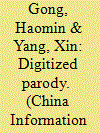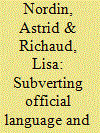| Srl | Item |
| 1 |
ID:
095326


|
|
|
|
|
| Publication |
2010.
|
| Summary/Abstract |
This article investigates egao-technology-enabled online parody in contemporary China. Egao is a site where issues of power struggle, class reconsolidation, social stratification, (online) community formation, and cultural intervention, along with the transformative power of digital technologies, intersect. Through an analysis of Hu Ge's "The Bloody Case of a Steamed Bun," we argue that egao provides an alternative locus of power, permitting the transgression of existing social and cultural hierarchies. Satiric and ludicrous in nature, egao playfully subverts a range of authoritative discourses and provides a vehicle for both comic criticism and emotional catharsis. As an individualized form of expression of the new digital generation, it also offers insight into the collective attitudes of the new class of netizens.
|
|
|
|
|
|
|
|
|
|
|
|
|
|
|
|
| 2 |
ID:
129805


|
|
|
|
|
| Publication |
2014.
|
| Summary/Abstract |
While the promotion of 'harmony' (??) in Chinese official discourse is widely regarded as a feature of state propaganda and censorship, scarce attention has been paid to the reception and redeployment of such language among Chinese citizens. The often creative and ironic reappropriation of official language in everyday speech practices, both on the Internet and in conversations with peers, is an important aspect of Chinese language/politics and deserves careful examination. Much of the current work has regarded these discursive practices in terms of a resistance to 'harmonization' or, following a Bakhtinian reading, as 'carnival'. We argue that such approaches do not fully take into consideration actors' actual experience of consuming and producing such language play. Based on semi-structured interviews with Chinese university students conducted in 2009-11, this article shifts away from the dominant assumptions about the role of ironic reiterations of official language, in order to highlight how the presumed repoliticization of these linguistic practices also involves a depoliticization, reflecting the complexity and ambiguity of the relationships they negotiate.
|
|
|
|
|
|
|
|
|
|
|
|
|
|
|
|